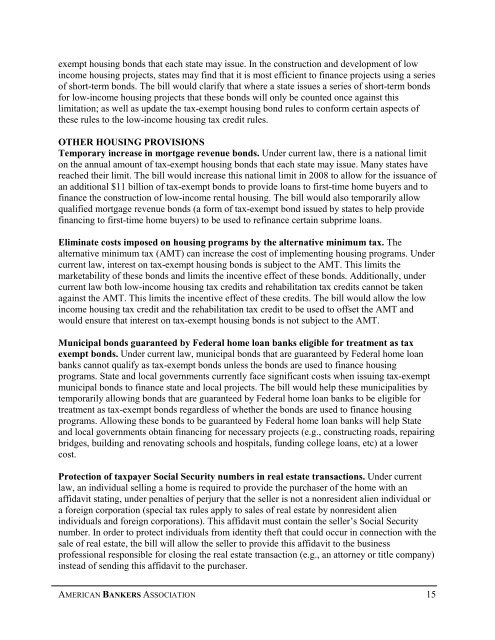Download Conference Presentations - Mortgage Lending Industry ...
Download Conference Presentations - Mortgage Lending Industry ...
Download Conference Presentations - Mortgage Lending Industry ...
You also want an ePaper? Increase the reach of your titles
YUMPU automatically turns print PDFs into web optimized ePapers that Google loves.
exempt housing bonds that each state may issue. In the construction and development of low<br />
income housing projects, states may find that it is most efficient to finance projects using a series<br />
of short-term bonds. The bill would clarify that where a state issues a series of short-term bonds<br />
for low-income housing projects that these bonds will only be counted once against this<br />
limitation; as well as update the tax-exempt housing bond rules to conform certain aspects of<br />
these rules to the low-income housing tax credit rules.<br />
OTHER HOUSING PROVISIONS<br />
Temporary increase in mortgage revenue bonds. Under current law, there is a national limit<br />
on the annual amount of tax-exempt housing bonds that each state may issue. Many states have<br />
reached their limit. The bill would increase this national limit in 2008 to allow for the issuance of<br />
an additional $11 billion of tax-exempt bonds to provide loans to first-time home buyers and to<br />
finance the construction of low-income rental housing. The bill would also temporarily allow<br />
qualified mortgage revenue bonds (a form of tax-exempt bond issued by states to help provide<br />
financing to first-time home buyers) to be used to refinance certain subprime loans.<br />
Eliminate costs imposed on housing programs by the alternative minimum tax. The<br />
alternative minimum tax (AMT) can increase the cost of implementing housing programs. Under<br />
current law, interest on tax-exempt housing bonds is subject to the AMT. This limits the<br />
marketability of these bonds and limits the incentive effect of these bonds. Additionally, under<br />
current law both low-income housing tax credits and rehabilitation tax credits cannot be taken<br />
against the AMT. This limits the incentive effect of these credits. The bill would allow the low<br />
income housing tax credit and the rehabilitation tax credit to be used to offset the AMT and<br />
would ensure that interest on tax-exempt housing bonds is not subject to the AMT.<br />
Municipal bonds guaranteed by Federal home loan banks eligible for treatment as tax<br />
exempt bonds. Under current law, municipal bonds that are guaranteed by Federal home loan<br />
banks cannot qualify as tax-exempt bonds unless the bonds are used to finance housing<br />
programs. State and local governments currently face significant costs when issuing tax-exempt<br />
municipal bonds to finance state and local projects. The bill would help these municipalities by<br />
temporarily allowing bonds that are guaranteed by Federal home loan banks to be eligible for<br />
treatment as tax-exempt bonds regardless of whether the bonds are used to finance housing<br />
programs. Allowing these bonds to be guaranteed by Federal home loan banks will help State<br />
and local governments obtain financing for necessary projects (e.g., constructing roads, repairing<br />
bridges, building and renovating schools and hospitals, funding college loans, etc) at a lower<br />
cost.<br />
Protection of taxpayer Social Security numbers in real estate transactions. Under current<br />
law, an individual selling a home is required to provide the purchaser of the home with an<br />
affidavit stating, under penalties of perjury that the seller is not a nonresident alien individual or<br />
a foreign corporation (special tax rules apply to sales of real estate by nonresident alien<br />
individuals and foreign corporations). This affidavit must contain the seller‘s Social Security<br />
number. In order to protect individuals from identity theft that could occur in connection with the<br />
sale of real estate, the bill will allow the seller to provide this affidavit to the business<br />
professional responsible for closing the real estate transaction (e.g., an attorney or title company)<br />
instead of sending this affidavit to the purchaser.<br />
AMERICAN BANKERS ASSOCIATION 15


